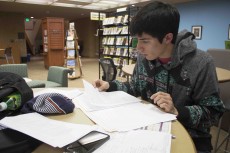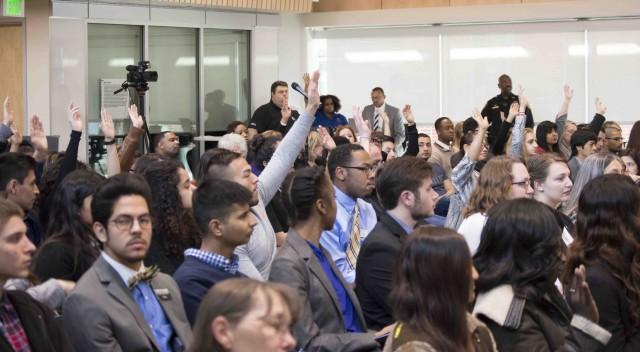By Kacey Parkinson/reporter

Bogdan Sierra Miranda/The Collegian
Preparing, paying attention and getting to know their professors are just a few of the tips provided to students who attended a Feb. 2 notetaking seminar on NW Campus.
Ryan Ferguson, NW supplemental instruction coordinator, discussed a variety of strategies for students to improve their notetaking skills.
“You don’t need to write down everything, but figuring out what is the thing to write down and what is not can be very tricky,” he said.
He encouraged students to read their textbooks before class but said reading a chapter from front to back is not the best technique for studying. Instead, students should use the preview-read-review method: reading the chapter summary or conclusion and any review questions first, then going back to read the chapter topic by topic.
“What you don’t want to do is take notes while you’re reading,” Ferguson said. “Our brains don’t really work that way.”
He said this advice also applies to highlighters.
“You are just going to end up with one giant pink or yellow page.”
Instead, notes should be written as part of the last step in the preview-read-review method.
Ferguson also had tips for effective notetaking during class, saying one mistake he notices is using a single notebook for multiple classes.
“This is a bad idea,” he said.
Instead, students should create separate notes for separate classes, either using divided multisubject notebooks or separate notebooks for each class.
In addition to getting to class on time or early, another way to do better, he said, is to sit in the front-center seats of the room.
“Students who sit closer to the front and closer to the center have a higher average course grade than students who sit closer to the sides and closer to the back,” he said.
Students should also not be afraid to ask questions during the class, he said.
“Yes, you can do that after class, and yes, you can look it up in the textbook, but the very best way to get clarification is to ask the person teaching the class,” he said.
NW graphic design student Casey Lindsey said she thought asking questions helped her classmates get answers to questions they might be afraid to ask themselves, a sentiment echoed by Ferguson.
“If one person has a question, it’s pretty likely other people have the same question, so you’re doing your classmates a benefit,” he said.
Learning how a professor indicates important information is also helpful for taking notes.
“Sometimes, they will come right out and tell you what’s going to be on the test,” he said.
Professors may emphasize important information in other ways, he said, such as repeating a lecture point several times or changing the tone of their voice.
Ferguson also said paying attention to the professor’s teaching style has benefits beyond the classroom.
“Having been in the professional world for a little bit now, being able to read people and figure out what they think is important is a really important skill to have,” he said.
For students who want to take notes digitally, Ferguson said that this approach has benefits, such as being able to color-code notes and the ability to move them between devices. However, students should be wary of potential problems such as social media distractions and the potential for data loss when storing files offline.
“You can upload your notes to the cloud, and you’re likely to never lose them,” he said. “Have a backup.”
After the seminar, NW student Bill Zimmer, who has returned to college after 30 years to earn an A.A.S. in logistics and supply-chain management, said the tips he learned were helpful.
“I knew a few things,” he said, “but also learned some things that will help me manage my five classes.”
Lindsey also benefited from the session.
“I struggle taking notes,” she said after the lecture. “It’s nice to have this information to help.”
























